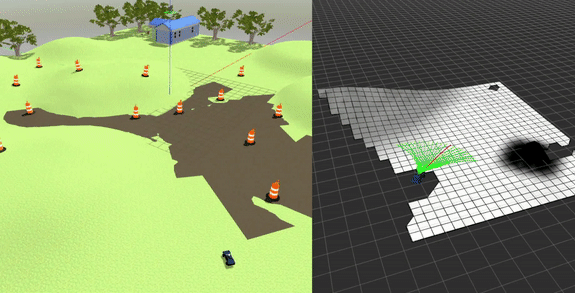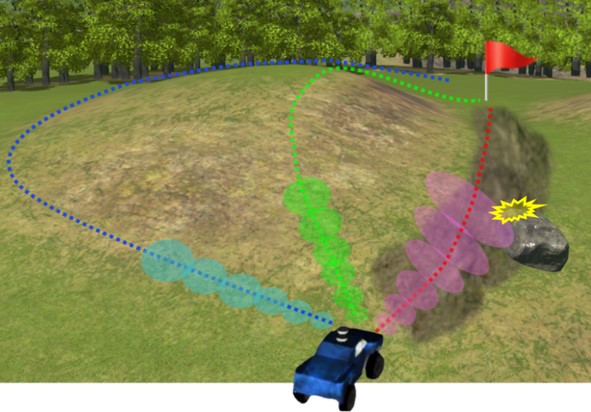A safe, efficient, and agile ground vehicle navigation algorithm for 3D off-road terrain environments. A video of the demonstration of the method can be found on YouTube.
We design a system that learns the terrain-induced uncertainties from driving data and encodes the learned uncertainty distribution into the traversability cost for path evaluation. The navigation path is then designed to optimize the uncertainty-aware traversability cost, resulting in a safe and agile vehicle maneuver.
Tested with ROS Melodic.
- To install Gazebo simulation environment -> Please follow the installation tutorial in "https://github.com/AutoRally/autorally.git"
- For Mapping modules -> Dependencis can be found at "https://github.com/leggedrobotics/traversability_estimation.git"
- NVIDIA Graphic card and Gpytorch is required
pip install gpytorch
- pytorch is required -> https://pytorch.org/get-started/locally/
Use the following commands to download and compile the package.
cd ~/catkin_ws/src
git clone https://github.com/HMCL-UNIST/offroad_navigation.git
cd ..
catkin build
Record state history for GP model.
- **Joystick required **. ros joystick input is used to control the vehicle manually while recording the state messages. To begin the recording process, first RUN
roslaunch autorally_gazebo gpmppi3d.launch
roslaunch gplogger gplogger.launch
roslaunch lowlevel_ctrl lowlevel_ctrl.launch
To enable data logging
-
- publish topic /gp_data_logging as "true"
*To save data *
-
- publish topic /gp_data_save as "true"
- Run the Gazebo Simulation :
roslaunch autorally_gazebo gpmppi3d.launch
- Run the preprocessing Modules :
roslaunch elevation_mapping elevation_mapping.launch
roslaunch traversability_estimation traversability_estimation.launch
- Run the uncertainty-aware path planning Module :
roslaunch gptrajpredict gptrajpredict.launch
- Run the Model predictive controller (MPPI) :
roslaunch mppi_ctrl mppi_ctrl.launch
- Run low level controller
roslaunch lowlevel_ctrl lowlevel_ctrl.launch
Hojin Lee, Junsung Kwon, and Cheolhyeon Kwon, Learning-based Uncertainty-aware Navigation in 3D Off-Road Terrains, 2023 ICRA
I would like to express my sincere thanks to following
- Our 3D Simulation environment and the Gazebo vehicle model is based on Autorally research platform
(Goldfain, Brian, et al. "Autorally: An open platform for aggressive autonomous driving." IEEE Control Systems Magazine 39.1 (2019): 26-55.)
- Elevation and traversability mapping modules used in preprocessing step are based on these awesome work.
( P. Fankhauser, M. Bloesch, C. Gehring, M. Hutter, and R. Siegwart,
“Robot-centric elevation mapping with uncertainty estimates,” in Mobile
Service Robotics. World Scientific, 2014, pp. 433–440.)
(P. Fankhauser, M. Bloesch, and M. Hutter, “Probabilistic terrain
mapping for mobile robots with uncertain localization,” IEEE Robotics
and Automation Letters, vol. 3, no. 4, pp. 3019–3026, 2018.)
(T. H. Y. Leung, D. Ignatyev, and A. Zolotas, “Hybrid terrain
traversability analysis in off-road environments,” in 2022 8th International
Conference on Automation, Robotics and Applications (ICARA).
IEEE, 2022, pp. 50–56.)


